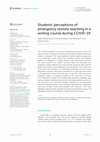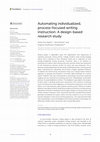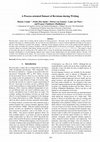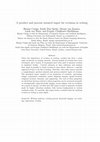Papers by Emily Dux Speltz

Frontiers in Education
The COVID-19 pandemic forced most educational institutions in the US to quickly transfer to emerg... more The COVID-19 pandemic forced most educational institutions in the US to quickly transfer to emergency remote teaching, finding many instructors and students unprepared. This study explored university students’ perspectives in a composition course during the emergency period and proposes guidance on designing a “student-friendly” online learning environment. This study examines the students’ concerns about and challenges with emergency remote teaching, the course’s benefits during the online learning period, and students’ recommendations for improvement. The research was conducted in seven sections of a multimodal composition course at a large, Midwestern university. Participants responded to a virtual discussion board at the beginning of online instruction and a survey after online instruction. Qualitative analysis of responses—guided by the Community of Inquiry (CoI) framework—showed that the participants expressed challenges with staying motivated, completing coursework, and feeli...

Frontiers in Communication, Oct 12, 2022
Writing quality is dependent upon the organization and sequencing of cognitive processes during w... more Writing quality is dependent upon the organization and sequencing of cognitive processes during writing. College students need writing-strategy advice that is tailored to their individual needs and is cognizant of their already-established writing processes. However, there is an obstacle to providing such advice: Both writing instructors and the writers lack awareness of the moment-by-moment actions by which text was produced. This is because switching between the processes of defining the task, coming up with ideas, outputting text, evaluating, and revising is largely regulated implicitly. To address this shortcoming, the present study uses a design-based research approach to develop and evaluate a minimally viable prototype of a system called "ProWrite" that uses novel biometric technology (concurrent keystroke logging and eye tracking) for providing real-time, individualized, automated, process-focused feedback to writers. This feedback is grounded in the analysis of each writer's individual needs and is presented in the context of a learning cycle consisting of an initial diagnostic, an intervention assignment, and a final follow-up. In two iterations, eight students used the system. E ects on student behavior were determined through direct analysis of biometric writing-process data before and after remediation and through changes in writing-process and written-product measures. Semi-structured interviews revealed that students generally considered the system useful, and they would try to use the newly learned strategies in their future writing experiences. The study demonstrated that individualized, real-time feedback informed by biometric technology can e ectively modify writers' processes when writing takes place.
sj-pdf-1-wcx-10.1177_07410883211052104 – Supplemental material for A Product- and Process-Oriented Tagset for Revisions in Writing
Supplemental material, sj-pdf-1-wcx-10.1177_07410883211052104 for A Product- and Process-Oriented... more Supplemental material, sj-pdf-1-wcx-10.1177_07410883211052104 for A Product- and Process-Oriented Tagset for Revisions in Writing by Rianne Conijn, Emily Dux Speltz, Menno van Zaanen, Luuk Van Waes and Evgeny Chukharev-Hudilainen in Written Communication

Revision plays a major role in writing and the analysis of writing processes. Revisions can be an... more Revision plays a major role in writing and the analysis of writing processes. Revisions can be analyzed using a product-oriented approach (focusing on a finished product, the text that has been produced) or a process-oriented approach (focusing on the process that the writer followed to generate this product). Although several language resources exist for the product-oriented approach to revisions, there are hardly any resources available yet for an in-depth analysis of the process of revisions. Therefore, we provide an extensive dataset on revisions made during writing (accessible via https://hdl.handle.net/10411/VBDYGX). This dataset is based on keystroke data and eye tracking data of 65 students from a variety of backgrounds (undergraduate and graduate English as a first language and English as a second language students) and a variety of tasks (argumentative text and academic abstract). In total, 7,120 revisions were identified in the dataset. For each revision, 18 features have...

Reading and Writing
Revision plays an important role in writing, and as revisions break down the linearity of the wri... more Revision plays an important role in writing, and as revisions break down the linearity of the writing process, they are crucial in describing writing process dynamics. Keystroke logging and analysis have been used to identify revisions made during writing. Previous approaches include the manual annotation of revisions, building nonlinear S-notations, and the automated extraction of backspace keypresses. However, these approaches are time-intensive, vulnerable to construct, or restricted. Therefore, this article presents a computational approach to the automatic extraction of full revision events from keystroke logs, including both insertions and deletions, as well as the characters typed to replace the deleted text. Within this approach, revision candidates are first automatically extracted, which allows for a simplified manual annotation of revision events. Second, machine learning is used to automatically detect revision events. For this, 7120 revision events were manually annotat...
The effect of automated fluency feedback on written text production

Given the importance of revision in writing, revision has been a main topic of interest in writin... more Given the importance of revision in writing, revision has been a main topic of interest in writing research. Several models of revision have been developed, and a variety of taxonomies have been used to measure revision in empirical studies. Current advances in data collection and analysis have made it possible to study revision in more detail. However, a specific approach of how to do this is lacking. Therefore, this study aims to provide a comprehensive product-oriented and process-oriented tagset of revision. The presented tagset consists of ten properties of revisions: processing, trigger, orientation, evaluation, action, linguistic domain, spatial location, temporal location, duration, and sequencing. For each of these properties we detail how features related to these properties can be extracted manually or automatically, using keystroke logging, screen replays, and eye tracking. As a proof of concept, we show how this tagset is used to annotate revisions made by higher educat...










Uploads
Papers by Emily Dux Speltz